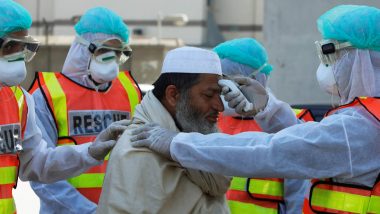Islamabad, June 10: Pakistan's top health official on Wednesday asserted that the government is following a "holistic" strategy to deal with the COVID-19 threat as he ruled out adopting the WHO's recommendation of implementing a two-week strict lockdown, intermittently, to stem the exponential spike in the coronavirus cases.
Pakistan on Tuesday registered its highest single-day spike of coronavirus cases with 5,387 new infections, taking the total tally to 113,702. The deadly virus has so far claimed 2,255 lives. Coronavirus Cases Surge in Pakistan, PM Imran Khan Remains Defiant in Announcing Lockdown.
Special Assistant to the Prime Minister on Health Dr Zafar Mirza said the government is pursuing a "holistic strategy to combat the coronavirus". The government, he said, is "conscious" of the disease spread and mortality and has put in place "a very robust" national coordinating and decision-making mechanism at the highest level.
"We have made best sovereign decisions in the best interest of our people. We have to make tough policy choices to strike a balance between lives and livelihoods,” Mirza said. He said Pakistan has consciously but gradually eased generalised lockdowns but at the same time has focused on enforcement of standard operating procedures (SOPs) in shops, industry, mosques and public transport.
In a letter to the Punjab health minister last week, the World Health Organisation said the virus has spread all over the country, and a large number of cases had been recorded in big cities. The cases had increased sharply after the easing of lockdown. It ranks Pakistan among the top-10 most affected countries.
The letter appreciated Pakistan's efforts in fighting COVID-19, but warned that recent statistics suggest its current strategy was not paying off. It recommended that the government adopt a two-week-on, two-week-off lockdown, as it offered the most chance of continuing economic activities while ensuring public health, the Express Tribune reported.
Mirza said Pakistan's choice of policies has been guided by the best evidence available about the disease spread and the best assessment of the fast deteriorating socio-economic conditions in the country. "WHO is a UN specialised technical agency on health...We understand that it is their role to provide recommendations to member states but understandably theirs is the health-lens, whereas governments have to take into account a holistic picture and make decisions on relative risk assessment basis and this has been the case in Pakistan all along," he said.
Mirza said the government has made mask donning compulsory. It has also developed a robust tracing, testing and quarantine policy to identify hotspots and cordon-off them.
"Currently, there are more than 700 such smart lock-downs in place. Another plank of our strategy is ramping up our health system capacity to cater to the growing number of patients," he said.
Mirza said the National Command and Operation Centre, established under the auspices of National Coordination Committee (NCC) for COVID-19, meet every morning at ministerial level to evolve the response. The meeting reviews the disease data and trends very minutely and takes a holistic view of the situation along with the provinces and develops recommendations for the NCC that is chaired by the prime minister and participated by all chief ministers and prime minister of Pak-occupied Kashmir.













 Quickly
Quickly





















